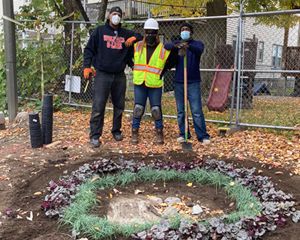
Funding Community-Led Climate Action
Elevating and empowering the communities most often impacted by extreme weather events to fund and implement solutions on their terms.
Dianne Hills is the executive director of My Brother’s Table, a soup kitchen and service agency serving residents in Lynn, on the North Shore of Massachusetts. Through her work, she has witnessed the burdens residents of her city bear when it comes to climate impacts. Extreme heat has been especially harmful for the community.
“I’ve been a part of a group working on climate change adaptation and resilience, particularly around responding to extreme heat events in our community,” Hills says. “In Lynn, we have many people who are high risk for heat-related illnesses because of existing conditions. It doesn’t help that our city’s characteristics—sparse vegetation, inadequate shade, heat-absorbing infrastructure and lack of access to air conditioning—put residents at additional risk.”
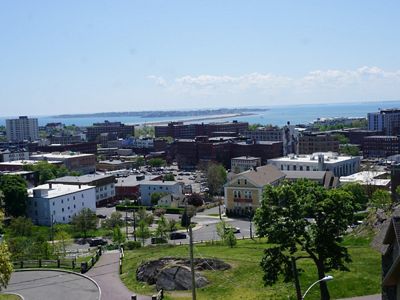
Communities and Climate Challenges
Hills' community isn’t the only one facing challenges from the effects of climate change. Recent years have brought people across Massachusetts and beyond face-to-face with the current and future realities, from heat stress and poor air quality to extreme weather and flooding. More intense impacts often affect communities that don’t always have the resources available to manage them or recover after an event.
Residents of many communities are rarely included in conversations and decisions about the resources and solutions needed to address climate change impacts. Yet, they are the witnesses to what’s happening on the ground—their understanding of the community, its assets and challenges are critical. Since we must build a more resilient future for all, it is essential for communities to have input in the decisions that affect them.

“When residents and community are a part of the decisions about their surroundings, it brings ownership and purpose,” says Jonathan Guzman, former external affairs manager at Groundwork Lawrence, a nonprofit focused on building a healthy community in the city of Lawrence through engagement with all residents. “They feel empowered to improve quality of life and build healthier communities.”
Weaving Community Resilience Into Climate Funding
It’s about a combination of developing solutions and allocating resources for climate adaptation. Organizations like Groundwork Lawrence, My Brother’s Table and countless others who are embedded in addressing the challenges their communities face haven’t always been invited to or included in the critical convening of local leaders that shape the funding and tools for addressing the causes and impacts of climate change. The funding that is available is often hard for communities to access and has restrictions or requirements that can make it harder for community-based organizations to meet their unique combination of needs, opportunities and challenges.
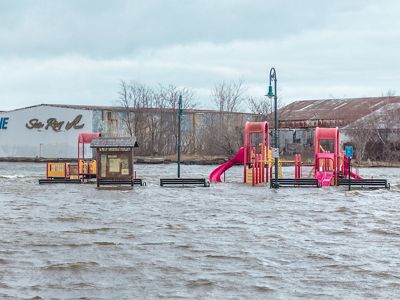
Given Massachusetts’ commitment to addressing climate change—with robust 2030 and 2050 targets, plans and policies—it is essential that communities are front and center throughout the process of developing and implementing solutions. In working alongside the state toward these climate goals, The Nature Conservancy, other environmental organizations and community-based organizations noticed the gap in state initiatives to effectively meet the funding needs of communities so they can prepare, respond and recover from the impacts of extreme weather events.
“Current funding and programs for climate mitigation and adaptation often do not meet community needs,” says Emma Gildesgame, climate adaptation director for TNC in Massachusetts. “So, we partnered with community-based organizations to learn from them and start working differently to get better results.”
Partnerships and Processes
Since 2019, a core team of conservation and community-based organizations convened by TNC has come together with the goal of securing additional funding for community-based solutions to improve resiliency and address the impacts of climate change. In direct partnership with community organizations and residents, the core team assessed the existing funding gaps and identified opportunities to improve what’s already in place.
A funding consultant also generated several proposed solutions for sustainable funding. The team then settled on a solution that places a fee on real estate property insurance premiums, which would fund initiatives in communities most impacted by extreme weather.
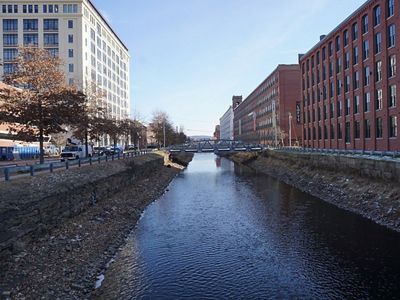
“It was critical for us to source solutions from communities, collaborating, co-creating and iterating on the process as we went,” says Steve Long, director of policy and partnerships for TNC in Massachusetts. “We built those relationships to develop consensus-driven decisions and learn to work at the pace of trust.”
“Our goal was to take a holistic, conservation and nature-based approach that included the communities directly affected,” adds Gildesgame.
The core team developed a legislative proposal, as well as a series of actionable recommendations that bring the findings of this collaborative effort to a broad audience of policymakers from the state, nonprofits and others working on making the state more adaptable to chnaging environmental conditions.
Some of the community-driven solutions identified through the process include:
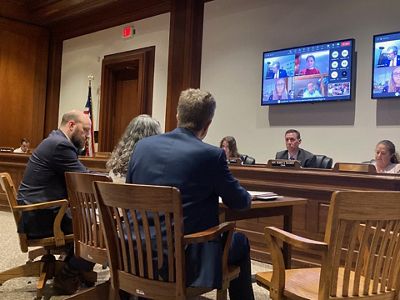
Putting Ideas into Action Through Policy
The core team drafted the legislative proposal in partnership with state Senator Sal DiDomenico and Representatives Natalie Blais and Patricia Duffy. The draft bill was shared with community partners for additional review—they provided critical input on all elements of the proposed legislation, which included concerns about how the funding mechanism would be set up, funding distribution and accountability, ensuring collaboration with community through in-person engagements and representation at all levels of the process, sharing information on programs with communities once they’re in place and more.
The final bill was filed with both the Massachusetts Senate and House of Representatives in February 2023 and was referred to the Environment and Natural Resources (ENR) Committee. The core team testified at public hearing in May 2023 and again in September 2025. Advocates of the recommendations and legislation are still moving forward the findings and recommendations embodied in the bill to influence policy, projects and collaboration across Massachusetts and beyond.
The Proposed Legislation Would:
- Generate long-term, sustainable revenue for climate adaptation and mitigation in Massachusetts through a small fee on real estate property and casualty insurance.
- Establish the Climate and Community Resilience Trust Fund, dedicated to supporting solutions for residents and communities.
- Establish a board to determine a process for fund administration.
- Focus support for community-identified planning and implementation of climate solutions, particularly in communities facing extreme weather threats.

Sign Up for Our E-Newsletter
Get updates on initiatives like this and many others in a monthly email.

